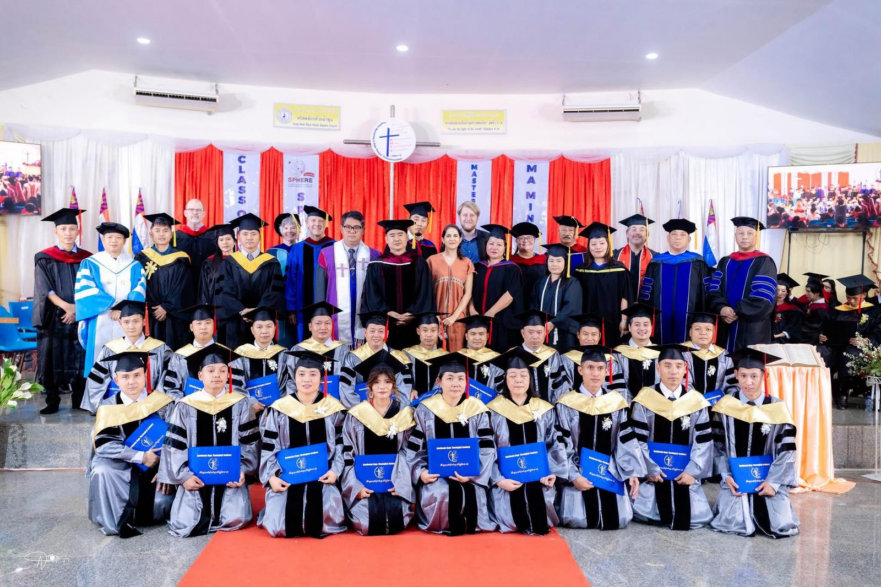April 4, 2025
By Trent Martin, 21W Advocacy and Training Coordinator
21 Wilberforce team members recently attended the graduation ceremony of Kawthoolei Hope Theological Seminary near the Thai-Burma border. It was an impactful event, witnessing 48 young leaders from the Karen community graduate from the theological and political studies programs. Their launch into their communities comes at a turbulent time marked by civil war, a devastating earthquake, and significant cuts in humanitarian aid to Burma.
During our visit, we met with leaders from the Mae La Refugee Camp and with ministries that operate schools and aid programs along the border. A freeze by the U.S. Agency for International Development (USAID) halted funding for critical services, including medical clinics and fuel for water pumps. These services are vital for more than 90,000 refugees—mostly from the Karen ethnic group—living in nine camps along the border, having fled war and persecution by the Myanmar military junta. Although aid organizations have since been allowed to resume their work for the next few months, operations have not returned to normal.
The principal of the Karen Bible College in Mae La shared that the monthly food allowance for standard recipients—about 50% of camp residents—has been slashed by nearly 75%, from roughly $9.44 to just $2.26. More vulnerable individuals have seen smaller reductions of about 10%, as they are prioritized in aid distribution. While medical clinics are operating again, they remain under-resourced. Serious cases continue to be sent to Thai hospitals, where refugees must pay for most of their care. Many Thai doctors supporting this crisis are facing burnout, with some seeing up to 70 patients a day.
These aid cuts are forcing many refugees to take risks, illegally leaving the camps to seek under-the-table work to support their families. Legal work permits and valid IDs for Thailand are out of reach for most refugees due to the high costs and lengthy bureaucratic processes.
William, the principal of Shalom Arts and Leadership College—a liberal arts school in Mae La Camp with 420 students—shared the heartbreaking impact of the ongoing freeze on U.S. refugee resettlement. Many students have lost hope of resettling in the United States and see no path forward. With their homes in Burma destroyed or under threat, they feel stuck in limbo. As a result, some students have lost motivation in their studies. William also expressed concern about the easy availability of cheap drugs in the camp, making it all the more essential for schools like his—and the local Bible college—to continue offering young people purpose, structure, and hope.
Over dinner, we spoke with two Australian Baptist who help coordinate Sharing Hope. Sharing Hope is a non-profit that supports the Karen community in Thailand and Burma by supporting schools and dormitories, offering scholarships, providing medical care, distributing emergency relief, and helping rebuild villages. A key strength of their work is its local leadership—most programs are run by Karen leaders themselves. With the vast need of people fleeing from war, their school dorms are sometimes filled to capacity. Despite these challenges, they often offer scholarships to students who cannot afford tuition. They noted that although European aid to NGOs on the border largely remains steady, USAID cuts have forced many organizations to reduce their budgets by about a third. The Mae Tao Clinic, run by Dr. Cynthia Maung (recipient of the Baptist World Alliance’s 2017 Denton and Janice Lotz Human Rights Award), also experienced partial funding cuts. The clinic treats thousands of people from Burma who often walk for days through the jungle to get to the clinic. It also operates as a critical training center for health workers along the border and in ethnic communities in eastern Burma.
While the Karen community along the Thai-Burma border was not directly impacted, a 7.7-magnitude earthquake struck central Myanmar on March 28 at 12:50 p.m. local time. The epicenter was near Sagaing, close to the city of Mandalay. Current reports indicate over 3,000 deaths, with some estimates suggesting the toll may reach 10,000. Cities including Mandalay and Naypyidaw have suffered extensive damage. Baptist church contacts in Myanmar report that at least 15 churches collapsed, with many others severely damaged. Numerous other places of worship—including Buddhist monasteries and mosques—were also destroyed, many of the mosques crowded during the close of Ramadan. Rescue efforts are hindered by ongoing conflict and damaged infrastructure. The military junta continued to drop bombs even after the earthquake, adding to the death toll of civilians.
In response, coalitions of churches, nonprofits, and Burmese diaspora groups are calling on the international community to support Myanmar in its recovery. They are advocating for earthquake relief, refugee support, continued humanitarian aid, and justice for those working toward a freer and safer Burma.
Through the Baptist World Alliance, you can contribute to the Myanmar Baptist Convention’s disaster relief efforts, which include food, medical care, and shelter for thousands affected by the earthquake. We must also not forget to stand with the tens of thousands of people who have fled oppression and persecution as refugees in Thailand and other neighboring countries. 21Wilberforce continues to stand with the people of Burma, advocating for a future where the government protects its citizens rather than attack them—and supporting the courageous individuals working to build that just future.
Caption text: 21Wilberforce team and Spring 2025 graduates of Kawthoolei Hope Theological Seminary near the Thai-Burma border

